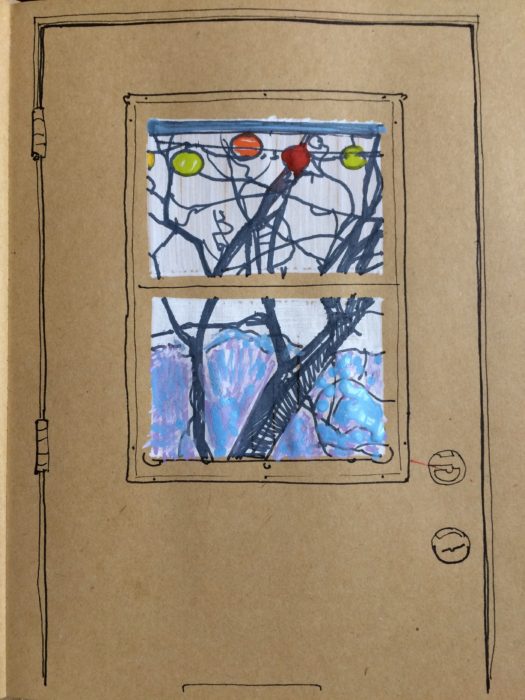Reading books with Lucy is not like any other reading I have done. A current favorite is Curious George Visits the Library, and this is how it goes.
Lucy [toddling over waving book]: Wreedt!
Me: [sitting down on the nearest patch of chair or clear floor and pulling her onto my lap, still clutching the book]: Sure.
Lucy [chuckle-gurgles of delight, holding up the book]: Wreedt!
Me: “Curious George Visits the Library.”
Lucy [opens to title page]: Wreedt.
Me: “Margaret and H. A. Rey’s Curious George Visits the Library. Illustrated in the style of—
Lucy [turns to middle of book]: Wreedt!
Me: “It was story hour! George loved stories. He sat down with a group of children to listen. The librarian was reading a book about a bunny. George liked bunnies. Behind the librarian—”
Lucy: Manki!
Me: Yes! George.
Lucy: Doge.
Me: “Behind the librarian was a book about a dinosaur. George liked dinosaurs even more. He hoped she would read it next. But next the librarian read a book about a train. George tried to sit quietly and wait for the dinosaur book to be read. But sometimes it is hard for a little monkey to be patient.”
Lucy: Wreedt.
Me: This page is done. Want to turn the page?
Lucy [takes the proffered single page]: Wreeedt!!
Me: Can you say that without whining?
Lucy: Wreedt.
Me: And can you say please?
Lucy: Peese.
Me: Thank you. “When the librarian started a story about jungle animals, George could not wait any longer. He had to se the dinosaur book. He tiptoed closer. ‘Look, a monkey!’—”
Lucy: Manki!
Me: “shouted a girl. The librarian put her finger to her lips. ‘We must be quiet so everyone can hear,’ she said nicely. ‘But there’s a monkey!’ said a boy. The librarian nodded and smiled. ‘Mmm-hmm,’ she agreed. When she finished reading the jungle story, the librarian reached for—”
Lucy [pointing to the picture of George’s rump disappearing around the corner]: Doge!
Me: Yes! George. “—the dinosaur book. Where did it go? And where was George?”
Lucy [turns a chunk of pages]: Wreedt.
Me: “Until—CRASH!—George and the cart ran smack into a shelf of encyclopedias. Books flew up in the air. And so did George! He landed in a big pile right between O and P.”
Lucy: Wreedt!
Me: This page is done.
Lucy [turns backward a chunk of pages]: Wreedt!
Me: “George found so many good books, he soon had more than he could carry. He leaned against a shelf to rest. Squeak, went the shelf. ‘Shhh!” said a man. Squeak, went the shelf again—and it moved! Why, it wasn’t really a shelf after all. George had found a special cart for carrying books. What luck! Now George—”
Lucy [flips almost to end of book]: Wreedt.
Me: “With his books under one arm, George waved goodbye to the volunteer, the librarian, and the children from story hour. ‘Come see us again, George,’ the librarian said, waving back. ‘Enjoy your books!’”
Lucy [turns to last page]: Wreedt!
Me: “And so he did. The end.”
Lucy [flips to middle of book]: Wreedt.
